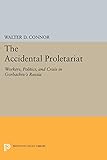The Accidental Proletariat : Workers, Politics, and Crisis in Gorbachev's Russia / Walter D. Connor.
Material type: TextSeries: Princeton Legacy Library ; 163Publisher: Princeton, NJ : Princeton University Press, [2014]Copyright date: ©1991Edition: Course BookDescription: 1 online resource (394 p.)Content type:
TextSeries: Princeton Legacy Library ; 163Publisher: Princeton, NJ : Princeton University Press, [2014]Copyright date: ©1991Edition: Course BookDescription: 1 online resource (394 p.)Content type: - 9780691604992
- 9781400862405
- 322.20947 20
- HD8526.5
- online - DeGruyter
- Issued also in print.
| Item type | Current library | Call number | URL | Status | Notes | Barcode | |
|---|---|---|---|---|---|---|---|
 eBook
eBook
|
Biblioteca "Angelicum" Pont. Univ. S.Tommaso d'Aquino Nuvola online | online - DeGruyter (Browse shelf(Opens below)) | Online access | Not for loan (Accesso limitato) | Accesso per gli utenti autorizzati / Access for authorized users | (dgr)9781400862405 |
Browsing Biblioteca "Angelicum" Pont. Univ. S.Tommaso d'Aquino shelves, Shelving location: Nuvola online Close shelf browser (Hides shelf browser)

|

|

|

|

|

|

|
||
| online - DeGruyter Catholic Bishops in American Politics / | online - DeGruyter Ritual in an Oscillating Universe : Worshipping Siva in Medieval India / | online - DeGruyter The Presence of the Past in a Spanish Village : (Published in cloth as Santa Maria del Monte) / | online - DeGruyter The Accidental Proletariat : Workers, Politics, and Crisis in Gorbachev's Russia / | online - DeGruyter Japan's Response to the Gorbachev Era, 1985-1991 : A Rising Superpower Views a Declining One / | online - DeGruyter Political Life in Japan : Democracy in a Reversible World / | online - DeGruyter Cooperation and Discord in U.S.-Soviet Arms Control / |
Frontmatter -- Contents -- List of Tables -- Preface -- List of Abbreviations -- Introduction -- 1. Workers and Society: From Tsarism to Socialism -- 2. A New Working Class ? Hereditization and Education under Khrushchev and Brezhnev -- 3. Forming Workers: Choice, Selection, and Tracking -- 4. Work, Wages, and Welfare -- 5. Labor, Authority, Autonomy -- 6. Regime Control and Worker Opposition -- 7. Worker Politics and Economic Crisis -- Epilogue -- Notes -- Index
restricted access online access with authorization star
http://purl.org/coar/access_right/c_16ec
Walter Connor shows how the seven decades since Stalin launched the First Five Year plan have changed Soviet workers from a disorganized mass of unskilled ex-peasants into something very much like a class--not the working class intended by Lenin and Stalin but a new and powerful "accidental proletariat," produced by forces partly beyond the state's control. Does this new "proletariat" threaten glasnost and perestroika? To address that question, Connor examines the growth of the new "class" and its role in the crisis-ridden politics of Gorbachev's USSR. In this book, as in his earlier works, Connor focuses on the interplay of social and political forces. Do workers support economic reform, he asks, or oppose it? Are they beneficiaries or victims of Gorbachev's policies? Can a Soviet state already under severe ethnic and economic strains accommodate an emergent working-class politics? Connor probes these issues in a work that is essential reading for students of Russian politics, government officials faced with the uncertainties of a new Russia, and people seeking to do business in any economy previously isolated behind geographical, military, and institutional barriers.Originally published in 1991.The Princeton Legacy Library uses the latest print-on-demand technology to again make available previously out-of-print books from the distinguished backlist of Princeton University Press. These editions preserve the original texts of these important books while presenting them in durable paperback and hardcover editions. The goal of the Princeton Legacy Library is to vastly increase access to the rich scholarly heritage found in the thousands of books published by Princeton University Press since its founding in 1905.
Issued also in print.
Mode of access: Internet via World Wide Web.
In English.
Description based on online resource; title from PDF title page (publisher's Web site, viewed 30. Aug 2021)


